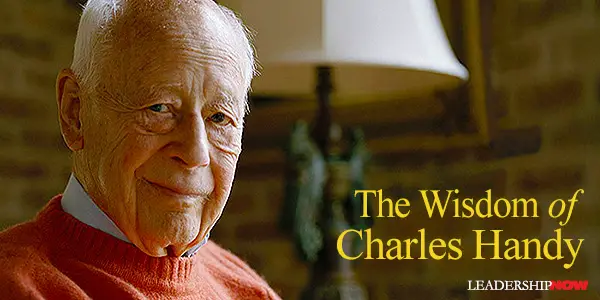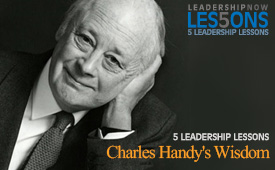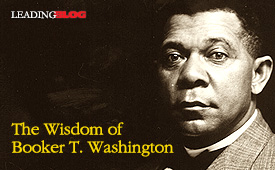The Wisdom of Charles Handy

SOCIAL philosopher Charles Handy died at 92 on December 13, 2024. He specialized in organizational behavior and management. From his books, The Hungry Spirit, The Age of Unreason, and 21 Letters on Life and Its Challenges are a selection of his wisdom.
Growth does not have to mean more of the same. It can mean better rather than bigger. It can mean leaner or deeper, both of which might improve rather than expand the current position. Businesses can grow more profitable by becoming better, or leaner, or deeper, more concentrated without growing bigger. Bigness, in both business and life, can lead to a lack of focus, too much complexity, and, in the end, too wide a spread to control. We have to know when big is big enough. — The Hungry Spirit
I still find, after all these years, that I need some psychological “stroking” at least once a week, someone to say, “That was great. You really did an excellent job there.” “How then,” I ask managers, “do you think that people in your organizations can survive with one psychological stroke a year, usually combined with some well-intended but critical comment?” Our self-respect is a fragile thing, even if we pretend otherwise—damage it and we cease to listen. — The Hungry Spirit
To be loved, to be held in genuine affection, is the best foundation for learning about oneself. Such love does not have to be uncritical, nor undemanding. In fact, the more demanding and the more exacting in its expectations the better for our learning, provided that the love is synonymous with unconditional positive regard. — The Hungry Spirit
If changing is, as I have argued, only another word for learning, then the theories of learning will also be theories of changing. Those who are always learning are those who can ride the waves of change and who see a changing world as full of opportunities rather than of damages. They are the ones most likely to be the survivors in a time of discontinuity. If you want to be in control of your change, take learning more seriously. — The Age of Unreason
Young people today often start off their working lives in an organization, be it in business, government, or the charity sector. That is sensible, for a time. I see such organizations as the graduate schools for work. They introduce young people to the necessary disciplines of work, the routines and systems, the need to sell as well as produce, the numbers that matter, and the people who can be relied upon. If the organization does not provide the intimacy of a small group and space to use your initiative to make a difference, you should move on, having finished your graduate apprenticeship. Humans are not meant to be machines. — 21 Letters on Life and Its Challenges
Organizations do need to be organized. The flow of work needs to be compartmentalized and people need to know what they are required to do, by when, and to what standard; but that is managing the work, not the individuals. The difference is crucial. If I know what I am meant to be doing and I believe it to be either useful or necessary, I will do it without someone looking over my shoulder. — 21 Letters on Life and Its Challenges
I call that leadership: creating the conditions for good work, choosing the right people and setting them standards of achievement that they can understand, and rewarding them when they meet them. You may say that I am just playing with words — but words describe the world, even the local world of the organization. I now believe that work needs to be organized, that things should be managed, but that people can only be encouraged, inspired, and led. (By things, I mean the buildings, information systems, or anything else physical.) — 21 Letters on Life and Its Challenges
Humans should only be used to do what humans do best: coming together to get things done as sensibly and creatively and effectively as possible. The technology should not try to do what humans do better, and vice versa. — 21 Letters on Life and Its Challenges
* * *

Follow us on
Instagram and
X for additional leadership and personal development ideas.



Posted by Michael McKinney at 08:39 AM
Permalink
| Comments (0)
| This post is about Leadership









